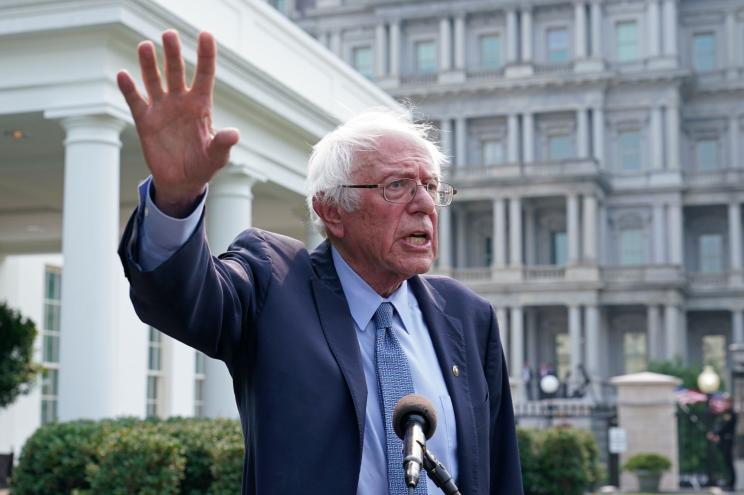Are you curious to know how Bernie Sanders, at the age of 82, continues to wield influence in American politics? Look no further! In this article, we will explore Sanders’ background, his key issues and stances, his presidential campaigns, and his post-election impact. Sanders, born and raised in Brooklyn, New York, has had a long and impactful political career, serving as a mayor, a member of the U.S. House of Representatives, and a U.S. Senator. He is known for advocating for income equality, opposing excessive military spending, and championing universal healthcare and free tuition. Despite controversies and challenges, Sanders remains a powerful force within progressive politics, contributing to the evolving policies of the Democratic Party. Join us as we delve into the ongoing influence of Bernie Sanders in American politics.
Early Life and Political Career
In his early life and political career, Bernie Sanders experienced significant milestones that shaped his journey in American politics. From his humble upbringing in the Flatbush area of Brooklyn to his activism during the civil rights movement and the March on Washington, Sanders developed a deep-rooted passion for social justice and equality. This passion propelled him to become the mayor of Burlington, Vermont in 1981, where he implemented progressive policies and advocated for the working class. His time as mayor showcased his commitment to grassroots activism and his ability to bring about tangible change at the local level.
Sanders’s time in Congress further solidified his reputation as a champion for progressive causes. Serving as a member of the U.S. House of Representatives from 1991 to 2007, he founded the Congressional Progressive Caucus and fought tirelessly for income inequality, tax reform, universal healthcare, and campaign-finance reform. His role in the Democratic Party has been instrumental in pushing the party to the left and advocating for policies that prioritize the needs of the working class.
Throughout his political career, Sanders has remained dedicated to his principles and has never been afraid to challenge the status quo. His upbringing, activism, time as mayor, and tenure in Congress have all contributed to his unwavering commitment to progressive values. As he continues to advocate for a more equitable and just society, Bernie Sanders’s impact on American politics remains undeniable.
Key Issues and Stances
Bernie Sanders’s key issues and stances revolve around advocating for economic equality and social justice. He has been a vocal critic of income inequality in the United States, highlighting the stark disparities in wealth and opportunity that exist. Sanders has consistently pushed for policies that address this issue, such as raising the minimum wage, implementing progressive taxation, and fighting for workers’ rights.
Another key issue that Sanders has been passionate about is his opposition to the Iraq War. He was one of the few voices in Congress to speak out against the war, citing concerns about its legality, its cost in both human lives and taxpayer dollars, and the potential for destabilizing the region. This stance showcases Sanders’s commitment to prioritizing diplomacy and avoiding unnecessary military interventions.
Sanders is also a strong advocate for universal healthcare, believing that access to quality healthcare should be a right for all Americans. He has consistently championed a single-payer healthcare system, arguing that it would provide coverage for everyone while reducing costs and eliminating the profit motive from healthcare.
In addition to these key issues, Sanders has been a vocal proponent of campaign finance reform and stricter regulations on Wall Street. He believes that the influence of money in politics undermines democracy and perpetuates a system that benefits the wealthy at the expense of the working class. Sanders’s progressive policies and unwavering commitment to economic equality and social justice have made him a powerful force in American politics, influencing the Democratic Party and inspiring a new generation of activists and leaders.
| Key Issues | Stances |
|---|---|
| Income inequality | Advocates for policies such as raising the minimum wage and implementing progressive taxation to address wealth disparities. |
| Iraq War opposition | Strongly opposed the war, citing concerns about its legality, cost, and potential for destabilization. |
| Universal healthcare | Advocates for a single-payer healthcare system to ensure access to quality healthcare for all Americans. |
| Campaign finance reform | Calls for stricter regulations on Wall Street and believes in reducing the influence of money in politics. |
| Progressive policies | Fights for workers’ rights, supports environmental justice, and champions social justice issues. |
Presidential Campaigns
Sanders’s presidential campaigns have had a significant impact on American politics and the Democratic Party. Here are three key aspects to consider:
- Populist policies: Sanders’s campaigns were defined by his commitment to populist policies that resonated with a wide range of voters. His focus on income inequality, universal healthcare, and free college tuition appealed to many Americans, particularly younger Democrats who were drawn to his progressive agenda.
- Younger Democrats: Sanders’s campaigns energized and mobilized a new generation of voters. His ability to connect with younger Americans through his authentic and passionate message helped to galvanize support and build a strong grassroots movement. The enthusiasm and dedication of his followers brought new energy to the Democratic Party and pushed it to embrace more progressive ideas.
- Electability concerns and Biden’s victory: Despite the enthusiasm for Sanders’s progressive agenda, concerns about his electability played a role in the outcome of the 2020 Democratic primary. Many moderate Democrats worried that his policies were too far to the left to win a general election. Ultimately, Joe Biden emerged as the nominee, with a more centrist platform and a focus on unity and experience. Biden’s victory highlighted the challenges faced by Sanders in appealing to a broad coalition of voters.
Post-Election Influence
Continuing his impact on American politics, Bernie Sanders, at 82 years old, maintains a strong following and support base, as well as a continued advocacy for progressive causes. Sanders’ impact on progressive politics cannot be understated. His populist policies and unwavering commitment to progressive causes have played a significant role in shifting the Democratic Party to the left.
Sanders’ influence can be seen in the party’s adoption of key progressive issues such as income inequality, universal healthcare, and free tuition at public universities. His 2016 and 2020 presidential campaigns energized a new generation of Democrats, who resonated with his message of economic justice and social equality.
Even after his presidential campaigns, Sanders remains an influential force within progressive politics. He has published books outlining his vision for a more equitable society, such as ‘Our Revolution: A Future to Believe In.’ Through his grassroots organization, Our Revolution, Sanders continues to advocate for progressive causes and support progressive candidates.
Sanders’ post-election influence extends beyond his own political aspirations. He has inspired a new wave of progressive leaders, who are championing his vision for a fairer and more just America. As the Democratic Party continues to evolve, Sanders’ impact will undoubtedly be felt, shaping the party’s platform and policy agenda for years to come.
Congressional Hearing Exchange and Sanders’ Intervention
During a congressional hearing, Bernie Sanders, as the chair of the Senate labor committee, intervened to contain the escalating tension between Republican senator Markwayne Mullin and union boss Sean OBrien. The chaotic exchange between Mullin and OBrien had disrupted the proceedings, and Sanders stepped in as a mediator to restore order. Here are three key points about Sanders’ intervention:
- Restoring Order: Sanders, recognizing the need for civility and productive discourse, shouted at Mullin to sit down, reminding him of his role as a United States senator. He also banged his gavel in an attempt to regain control of the situation. Despite his efforts, the clash between Mullin and OBrien continued, highlighting the challenge of maintaining decorum in congressional hearings.
- Focusing on Economic Issues: Sanders tried to redirect the focus of the hearing to economic issues instead of the personal exchange between Mullin and OBrien. Recognizing the importance of discussing substantive matters, he aimed to steer the conversation towards topics that would benefit the American people.
- Impact on Public Perception: The chaotic congressional hearing and the clash between Mullin and OBrien likely had a negative impact on the public’s perception of Congress. Such incidents contribute to the existing contempt that many Americans have for their elected representatives. Sanders’ role as a mediator in this situation showcased his commitment to fostering productive dialogue and restoring respect in the political arena.
Sanders’ intervention in the congressional hearing demonstrated his ability to navigate difficult situations and fulfill his role as a mediator. While the chaos may have tarnished the image of Congress in the eyes of the public, Sanders’ efforts to restore order and redirect the conversation towards substantive issues reflect his commitment to productive and respectful political discourse.
Background Information on Mullin
Mullin’s background includes making his fortune in plumbing before entering Congress. He is a former cage fighter who had to clarify that he did not think he was Rambo after attempting to enter Afghanistan during the US withdrawal. Mullin’s controversies have further shaped public perception of him. One notable incident was his heated exchange with union boss Sean OBrien during a congressional hearing, which was interrupted by Bernie Sanders’ intervention. This incident had a significant impact on Congress, as it highlighted the growing tensions and lack of decorum within the legislative body. The public perception of Mullin was further tarnished as he challenged OBrien to expose him as a thug, while OBrien accused Mullin of being a schoolyard bully. This continued squabbling between Mullin and OBrien, despite Sanders’ efforts to restore order, only reinforced the negative perception of Congress and its members. It is crucial for representatives like Mullin to uphold the dignity and professionalism expected of their position, as their behavior directly affects public trust in the government.
Continued Squabbling and Public Perception of Congress
In the ongoing squabbling between Mullin and OBrien, their disrespectful behavior only reinforces the negative public perception of Congress and its members. This incident is just one example of the lack of professionalism and decorum that has become all too common in congressional conduct. The public approval ratings for Congress and its members continue to decline, and incidents like this only contribute to the growing disillusionment with our democratic institutions.
Here are three key points to consider:
- Impact on Democracy: The disrespectful behavior displayed by Mullin and OBrien undermines the integrity of our democratic processes. It erodes trust in our elected representatives and raises questions about their ability to effectively govern and make informed decisions on behalf of the American people.
- Lack of Professionalism: The exchange between Mullin and OBrien highlights the lack of professionalism that has become pervasive in Congress. Instead of engaging in constructive dialogue and working towards solutions, members are engaging in personal attacks and petty arguments. This behavior does not reflect well on the institution as a whole.
- Public Disillusionment: The incident involving Mullin and OBrien only adds to the existing contempt the American people have for Congress. The public is tired of the partisan bickering, the lack of progress, and the perceived disregard for the needs and concerns of the average citizen. This continued squabbling only reinforces the notion that Congress is out of touch with the realities of everyday Americans.
It is crucial for Congress to address these issues and strive for a more respectful and productive working environment. The future of our democracy depends on it.




